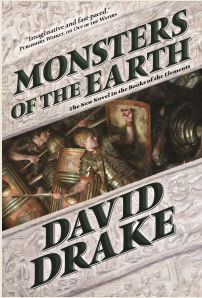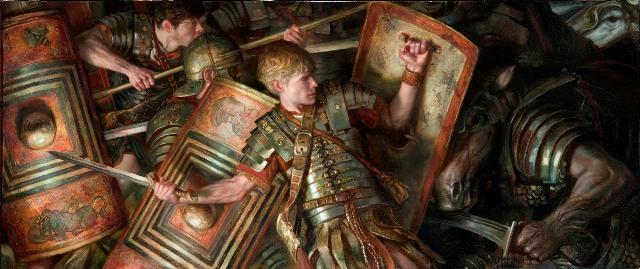Monsters of the Earth, the third of the Books of the Elements, will be out in September 2013 from Tor.
AUTHOR’S NOTE
I intend individual volumes in The Books of the Elements to be self-standing, (though I also hope that they add to something greater than the sum of their parts). This note will therefore repeat some things which I said in The Legions of Fire and in Out of the Waters.
The most important of these repetitions is that my fictional city of Carce (KAR-see) is not the historical Rome of 30 ad. (Neither is it the fictional city of Carce in The Worm Ouroboros, a novel by ER Eddison; which I urge you all to read.)
Here in Monsters, the most important difference is that the historical poet Vergil is also the mythical magician Virgil. In the Middle Ages, the idea grew that the author of the Aeneid was a powerful magician. The most pervasive aspect of this myth is that his name began to be spelled Virgil rather than the correct Vergil.
A magician’s wand in Latin is a virgilla, the diminutive of virga, a staff or branch, so the mythical magician became Virgil to make the connection clear. The poet’s name is still generally spelled Virgil, especially in America, because the myth became so widespread. This has occasionally caused me problems with copyeditors who are sure that I’m wrong in referring to Vergil.
Speaking of possible problems with copyeditors: the Old World sycomore tree is quite different from the North American sycamore. The Egyptians often built ships out of sycomore wood for want of anything better, though it wouldn’t ordinarily be recommended for such a purpose.
Which leads me to a further point: I make mistakes, but they’re usually not careless errors. I try to avoid reading reviews, because I get unreasonably angry at seeing a reviewer, for example, state that Romans didn’t really behave in some fashion that I describe.
Everybody has a right to an opinion. My opinions are based on extensive reading of Latin literature in the original, from Plautus to Macrobius. The folks who seem most determined to correct me appear to base their opinions on Hollywood–or perhaps on the Natural Wisdom which Plato claims Socrates believed in. Take your pick.
Most of the spells in Monsters are translated or paraphrased from the Sibylline Books, the Aeneid, and a West African (Yoruba) folktale. There are also snatches of Ovid, Diogenes Laertius, and goodness knows who else. We are what we eat, and I devour classical literature for pleasure.
In passing, I reread my OCT volume Vitae Vergilianae Antiquae, but that was mostly to refresh myself in the rhythms of Latin prose rather than as source material. I mostly read and translate verse nowadays.
Roman society was based on slavery, which I regard as an unspeakable evil, and was extremely class conscious even by later European standards. My dad was an electrician, and I am well aware of where I would have been placed in the Roman class structure. I know exactly how that feels, because I was a junior enlisted man in Viet Nam. I much prefer an egalitarian society.
That said, I describe the society of Carce as I understand the society of Rome in the 1st Century ad to have been: as a reporter, not an advocate. I shouldn’t have to mention this, but thirty years ago I was repeatedly pilloried for describing war as horrible by people who honestly thought I was advocating the horrors.
***
I am enormously fortunate to have Donato doing my Tor covers; this is another example of my good luck. Donato describes in a blog the way he went about creating it.

